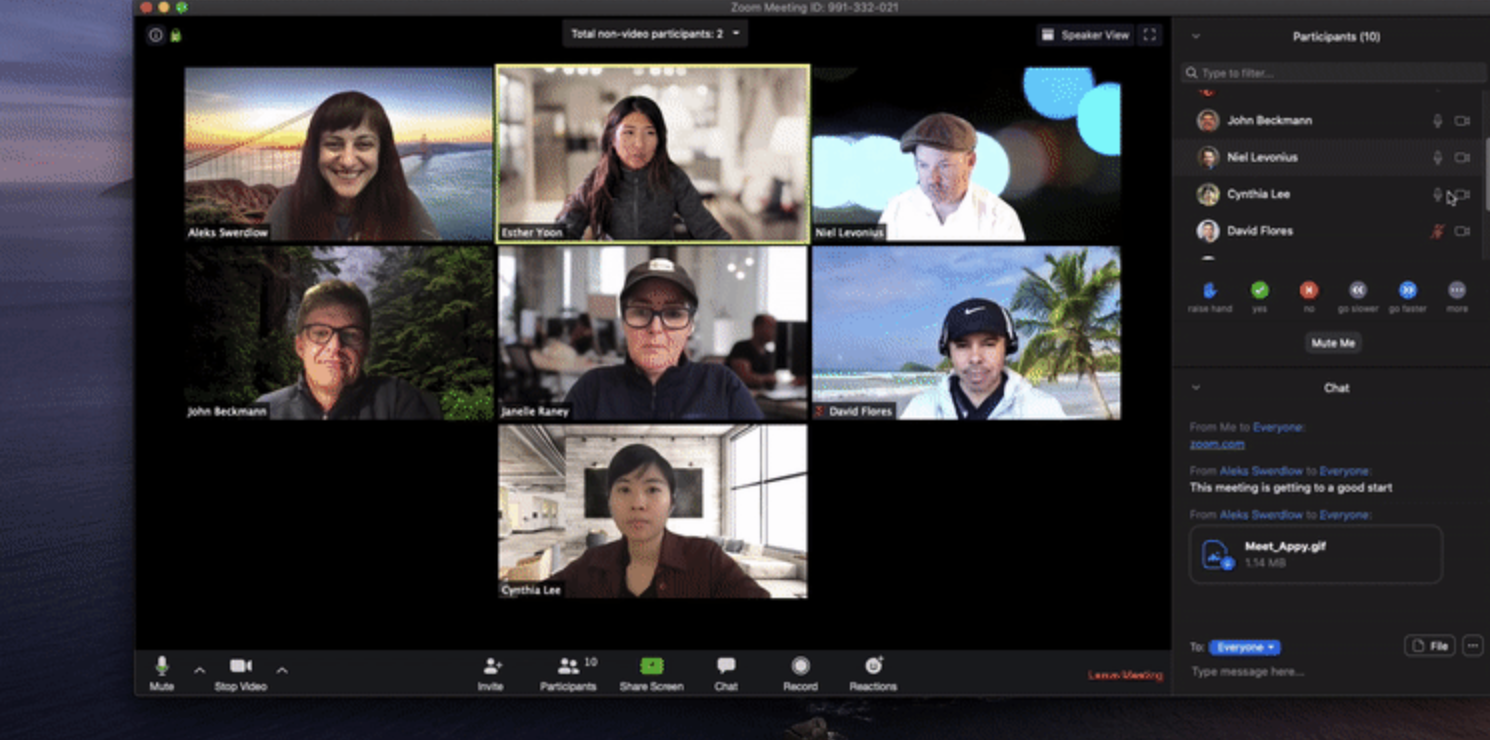It's safe to say that 2020 has radically shifted the way everyone works. For anyone running a sales team meeting in the past year, you've likely had to adapt how you manage, engage, and collaborate with your sales team.
While it's undoubtedly been challenging, this shift has also been an opportunity to purge bad meeting habits and adopt more effective ones that overall result in better communication. Now that we’ve gotten more comfortable with our new way of meeting, we can focus on overcoming other challenges.
Productivity is an important factor to tackle during sales meetings, but there are other key items that need to be a priority.
 Photo courtesy of Zoom.com
Photo courtesy of Zoom.com
Let's take a closer look at how to run a sales team meeting in 2021. The best practices outlined below will help you and your team become more efficient and productive this year.
Why Are Sales Meetings Important?
Sales meetings give your company's sales leadership the ability to discuss your lead management strategy, direction, needs, and concerns, as well as give leaders an understanding of how the business is tracking towards revenue goals.
Why Sales Reps Rely on Sales Meetings
Sales meetings provide incredible value to your sales reps by shaping how they focus their work. These meetings also give them an opportunity to ask questions, present new challenges, and gain helpful feedback on deals they are working on.
While it’s imperative to keep your revenue goals and sales numbers top of mind, it’s equally as important to recognize other markers that can be considered successes even if they aren’t closed deals yet. Discussing positive traction, big or small, is something that should be a top priority during your meetings. Building positive rapport with your sales reps and recognizing their hard work will motivate them to keep it up and maybe even work a little harder for you.
Goals of Your Sales Meetings
Your sales meetings may vary depending on your industry, sales cycle, and sales process, but there are some common goals all sales meetings will share including:
- Discussing strategic vision (both long and short term)
- Tackling any new or lingering challenges
- Celebrating small wins and keeping things positive
- Providing an open forum for sales reps to bring up issues or get new ideas
- Collaborating to overcome hurdles in the sales process
- Recognizing high performers for their outstanding work
When you get these right, you'll be left with an efficient meeting that leaves everyone feeling appreciated, motivated, and determined. You'll discuss the issues that the group needs to hear — nothing more and nothing less. Instead of wasting time, you'll give the sales rep the guidance and praise they need to drive them to perform better which in the end, will help the company grow.
CALCULATOR: Find Out The ROI of Optimizing Your Sales Process
What Are the Challenges That Sales Managers Face?
In 2020, sales managers faced the obvious issue of having to conduct sales team meetings without the benefit of an in-person presence. Due to work-from-home orders, sales managers have had to find creative ways to virtually connect with their sales teams. While there are plenty of options to assist with this such as video conferencing, it's still a new way of doing things for many sales teams. Virtual meetings have become the "new normal" for almost all organizational meetings over the past several months and are likely not going away any time soon.
With the loss of face-to-face work environments, the days of popping into your rep’s office to ask a quick follow-up question are also gone. That means sales meetings need to be much more thorough.
One common pitfall for sales meetings is that they can often descend into side discussions that veer away from the meeting's main objective. With most people working from home, there can be added pressure for everyone to prove their sales productivity and overshare how hard they are working.
Unstructured, round robin style meetings can easily get off track with each rep providing a blow-by-blow account of what they're working on. When everyone is sharing their work day in too much detail, it leads to calls that run too long and sadly, accomplish very little.
How to Plan and Run Your Sales Team Meeting
The key to planning your meeting is two-fold:
- Know what you want to discuss in advance and document it.
- Ask for input from the team and incorporate that into your agenda.
Having a well-thought-out meeting agenda is critical.
Crowdsourcing Your Sales Meeting Agenda
Prior to your team meeting, ask your sales reps if there are any challenges or obstacles they'd like to discuss. Use their input to build your agenda along with the topics you want to cover. If everyone contributes to the direction of the meeting, they can be focused and better prepared. This extra step will make the meeting more productive.
Asking for input prior to the meeting gets people thinking and shows that you as a sales manager take these meetings seriously and genuinely want to hear what they have to say. If a sales manager shows up to a meeting time and time again with the same generic agenda, it sends the message that you aren’t making this meeting a priority.
Avoid Postponing Meeting With Sales Reps
Canceling these meetings or scheduling over them sends a bad message to your team so whatever you do, don’t do it!
Effective Sales Meetings Demand Balance
Your mindset running into the meeting should strike a balance between being open to discussing what your sales reps want to talk about, while at the same time, focusing on efficiency. Of course, don’t forget to make things positive and have a little fun.
Remind your team that any updates that can be summarized in an email should be; this time is specifically dedicated to topics they need to collaborate on as a team. Your tone should be polite but firm here — tell your team members that your goal isn't to stifle discussion, but that you know they're busy and want to preserve their valuable time.
Your sales team will inevitably be grateful, as no one likes to spend time in excessive meetings.
How to Create a Sales Meeting Agenda Structure
Your agenda will vary, but below is a sample agenda you can use to guide your sales team meetings:
- Introduction/icebreaker (more on this below) — 5 minutes
- Leadership updates — 10 minutes
- Sales rep round robin — 10 minutes
- Open forum/closing discussion — 5 minutes
This is a recipe for a concise, effective 30-minute meeting. You may want to schedule an hour for these meetings if you have more to discuss or have a larger team, but generally speaking, no sales team meeting should fall outside the 30-60 minute time frame.
FREE SALES PRODUCTIVITY CALCULATOR: How Much Will Your Revenue Increase if Your Sales Reps Can Spend More Time Selling?
What You'll Cover in Your Sales Team Meeting
Warming Up Your Sales Meeting
The introduction/icebreaker is a way to engage your team with a fun, interactive question to get everyone thinking. For example, you could ask your team members an interesting question, like their favorite TV show or movie. Keep these topics light in subject matter and steer clear of politics or religion. There is a wealth of ice breakers available online you can borrow as well.
Instead of icebreakers, you could also choose to use this time for positive recognition and shout outs, either from you or other teammates. Regardless of which direction you chose to take, you should alway start your meeting off with high energy, positivity, and personal touches.
Keeping a sense of community is even more important in our virtual life now than it was before, so make it a priority.
Giving Effective Leadership Updates in Sales Meetings
Next, you'll hit on the leadership updates. This is where you’ll discuss your team's strategy, report on metrics, or talk about changes to the team's vision or direction. If there aren’t any leadership updates, you could choose to do a goal recap and share whether or not things are tracking.
Don't overpack this with material on your end — you'll likely get questions and want to leave time to field them.
Co-Create Solutions to Sales Rep Challenges
After your initial updates, you'll go to the team for their individual participation. This time shouldn't be focused on what they're working on in great detail, but rather the challenges they're facing.
Encourage your team to bring at least one thing they need guidance on to this part of the meeting to keep the team collaboration going.
In addition to challenges, if there's an update they have that will affect the rest of the team, they should share that as well. Ask your sales reps to share their successes so you can recognize achievement and inspire the rest of the team.
Remember that successes come in many forms and sizes so again, just because it’s not a closed deal doesn’t mean it isn’t a win. A lot of times in sales, the small stuff is what adds up to be the big stuff!
Wrapping Up Sales Meetings With Open Discussion
Finally, leave time at the end of the call for an open forum. Any issues that weren't raised (or that were but require follow-up) can be tackled here. You can also use this time to share outstanding ideas or findings that the team may like to hear. Whether it’s a new LinkedIn idea, a content request, or a suggestion for refining the sales process, let your team feel safe in sharing their thoughts.
These meetings will be virtual, so remember to be patient with team members dialing in late or experiencing technical difficulties. It's a challenging time for everyone and showing extra understanding as people manage to work from home can go a long way. Of course, if something becomes a consistent issue, take it up with your rep during a different time to keep your meeting on track.
Follow Up Sales Meetings With a Summary Email
When the meeting has concluded, follow up with an email summarizing action items and major decisions made on the call. This email is also another chance to call out positive things happening.
Reinforce your appreciation for their hard work and remind them that while they can’t pop into someone’s office right now, they still have a team that’s there to support them. If any team members require some one-on-one coaching, immediately follow up with an individual email or phone call to further support them.
Running a Sales Meeting Takeaway
If you plan, run, and follow up your meetings right, managing a sales meeting in 2021 can be a great way for your team to stay engaged and connected, albeit virtually.
The way you conduct the meeting will hopefully have them excited for the next one, instead of dreading it because it’s taking away from their beloved selling time. Follow these tips this year and you'll put yourself in a position to lead your team better without bogging them down.


